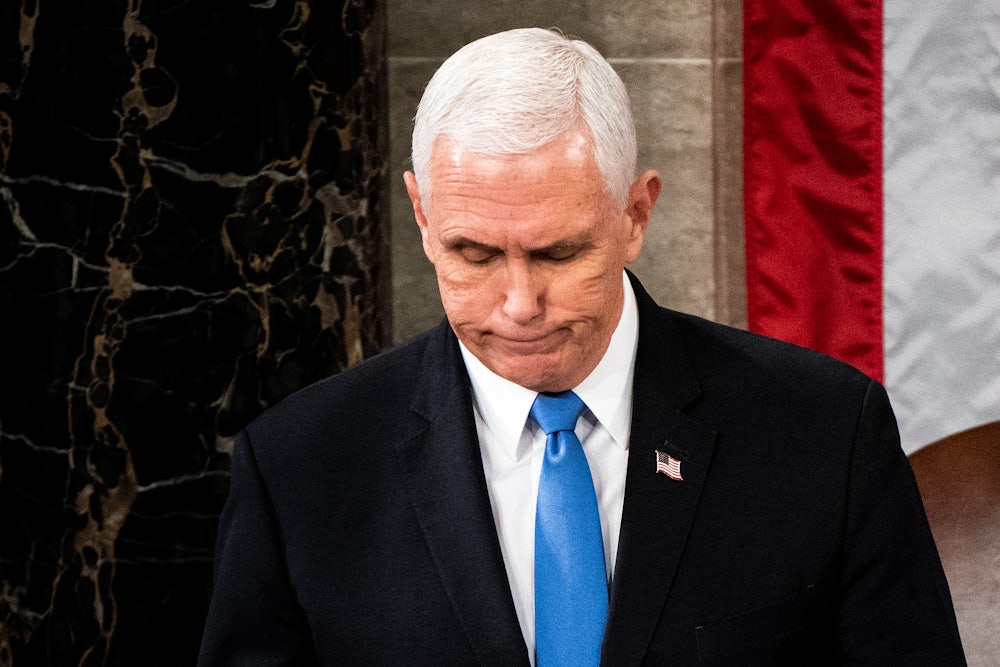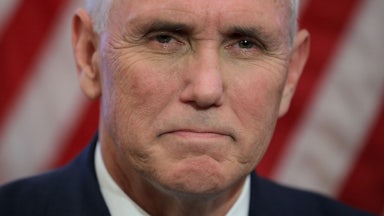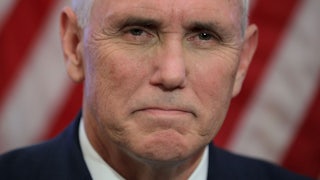Earlier this year, in an open letter, more than 200 staffers at Simon & Schuster called on the book publisher to cancel its book deal with former Vice President Mike Pence and not work with other Trump administration officials. The top brass at the publishing house were unmoved by the entreaty, however, and reasserted their intention to bring Pence’s book to market. “We come to work each day to publish, not cancel,” the company said in a statement.
On Thursday, those never-resolved frustrations boiled over anew at a town hall–style meeting in which the company’s CEO, Jonathan Karp, attempted to answer questions from staffers about the company’s thinking.
Throughout the Q&A, a recording of which was obtained by The New Republic, Karp returns to a simple binary. On one side, there are staffers who believe in “social justice.” On the other are those who believe in “free speech.” Early in the discussion, Karp laid out this thesis, telling his staff, “What’s going on right now is largely about a conflict that’s occurring between people who want—it’s basically progress and social justice within the company—and it’s in conflict the publisher’s rights to publish what they want to publish.”
“How we square that conflict is complicated,” he continued. “We’re going to have these conversations [about things] that people object to on a personal basis. Ethics are subjective. It’s really not our place as publishers to impose an ethical standard. We can impose a legal standard. But I don’t think we can impose an ethical standard. I want to call on something that F. Scott Fitzgerald wrote, which is that the test of a first-rate intelligence is the ability to hold two opposing ideas in their mind at one time and still retain the ability to function. In this case, the two opposing ideas are social justice and freedom of speech. And unfortunately for some of you, we are choosing the freedom of expression and the right that publishers have to choose the books they want to publish.”
Karp described the duty of publishers using an oft-cited comparison that Supreme Court Chief Justice John Roberts applied to his own work, in which judges were likened to baseball umpires. “I wish there were a uniform way of doing things. I think back on what Justice John Roberts said when he was being confirmed for the Supreme Court, and he talked about judges as being like umpires, and they call balls and strikes. That’s really what publishers do.… Some books are out of the strike zone.”
Karp repeatedly contended that staffers critical of the deals were viewing the company’s actions through a narrow lens. “The world,” he said, “is nuanced … it’s not a binary place. We have to embrace the complexity of these decisions.”
In conversation with The New Republic, several staffers expressed frustration with Karp’s attempts at explaining the company’s decision-making process, which they felt lacked that nuance. One referred to his answers as “a disappointment,” another as “condescending,” while a third referred to them as “an embarrassment,” and yet another referred to the whole meeting as a “mess.” More senior employees praised Karp for his openness to questions, noting it was uncharacteristic for a CEO, as well as the “good faith” conversation that resulted.
But the town hall did little to resolve the controversy that has engulfed Simon & Schuster in the wake of the announcement of Pence’s book deal. For most of the last four years, Simon & Schuster has been cast as the de facto publisher of The Resistance. Out of the company’s formidable galleys have emerged books from John Bolton, Bob Woodward, and the former president’s estranged niece, Mary Trump, which have sold millions of copies; several others, including Melania and Me, by Stephanie Winston Wolkoff, were bestsellers.* A June 2020 New York Times profile declared that the megapublisher was “the current front-runner in an ongoing race among publishers to produce news-making titles about the Trump administration.”
In the aftermath of Donald Trump’s electoral defeat, Simon & Schuster has continued to stake its claim as the most prominent publisher of political books, albeit with considerably more controversy and far less praise from those readers who snapped up the tomes they imagined would bring down Trump. This year, the publisher canceled a book contract with Missouri Senator Josh Hawley, citing his involvement in the January 6 insurrection at the United States Capitol; it also scotched plans to distribute a book written by one of Breonna Taylor’s killers.
In more recent days, seven-figure deals with Vice President Mike Pence and former Trump administration senior adviser Kellyanne Conway have led to considerable conflict with both the publisher’s staff and its authors.
Pressed about the Pence decision, Karp insisted he only agreed to work with the former vice president after his agent insisted there “would be nothing discriminatory” in the book and that the vice president had promised to be “candid” and enthusiastic about “answering the hard questions” regarding his time in the Trump administration. As one staffer noted in a follow-up, Pence now works at the Heritage Foundation, which, along with its political action committee, has boasted about its efforts to lobby on behalf of anti-trans legislation across the country. Karp responded by repeating that the book itself would contain no “discriminatory” language.
As one staffer noted after the meeting, these explanations conflict with each other. Answering the “hard questions” about his record would require Pence to address the fact that as a politician, he was best known for his embrace of a virulent strain of homophobia. His tenure as vice president hardly tempered his reputation: The Human Rights Campaign, for instance, labeled Pence “the worst vice president for LGBTQ people in modern American history.”
Following up on Karp’s initial defense of Pence, another staffer asked if Karp would acknowledge that the Trump administration directly endangered Muslims, immigrants, queer people, and people of color. Karp refused to answer, saying that he didn’t believe his opinion was “relevant.” Pressed again—the employee asked if they disagreed in their assessment of the Trump administration itself or just about the morality of paying one of its leading officials millions of dollars—he once again refused to answer, a moment several staffers cited with alarm after the meeting.
As one staffer told The New Republic, “[Karp’s] unwillingness to agree to a shared set of historical understanding makes a lot of the subsequent conversation meaningless. Much of the issue with Pence hinges on the basic understanding that he participated in policy and rhetoric that was beyond the pale. If Karp doesn’t think anything objectively terrible happened under Pence and Trump, then it’s not hard to see why he would publish him.”
“Seeing the executives of our company simultaneously claim to be anti-racist, while saying that they are actively choosing ‘freedom of speech’ over social justice, speaks to their fundamental misunderstanding of social justice,” another said. “Social justice, for many of us, is not a choice but a necessity for our survival. To be able to pick and choose when you want to be in favor of equity is privileged. It is heartbreaking, but also hypocritical, to see our executives use their privilege to dismiss and ignore their staff and authors’ legitimate, material concerns for our safety.”
While Karp invoked free speech often, he defended the company’s recent acquisitions by insisting that it was committed to publishing truthful accounts from its authors. He defended Conway’s deal in similar terms to Pence’s, saying that her deal was contingent on being truthful. Karp told staffers that Simon & Schuster would not publish a book by Donald Trump because he did not believe the former president was capable of writing a truthful book. It’s nevertheless a lot to expect from Conway, who infamously coined the term “alternative facts.”
That Hawley’s deal was canceled for his participation in the January 6 insurrection also provides a point of contradiction. After all, Pence has spent much of 2021 pushing what my colleague Matt Ford referred to recently as a “mild version of the Big Lie.” As Pence’s presidential campaign ramps up, his commitment to Simon & Schuster will likely come into conflict with his electoral ambitions, which will likely require Pence to continue the practice of undermining the legitimacy of the 2020 election.
It’s not clear what will happen if these books’ drafts arrive at Simon & Schuster packed with Big Lies or little ones. Book publishers are notorious for not consistently using fact-checkers, and Karp’s stated requirement that these books be truthful has not been matched with a plan to employ a fact-checker to ensure these authors keep their side of the bargain. That said, as one senior editor told me, “There is a problem common to every memoir, which is that you can only fact-check them to a certain point. Everybody who writes a memoir leaves some things out, tells stories in a slightly different way.” Not every memoirist has the power to affect the national interest, however.
Karp also cited Simon & Schuster’s decision to publish the work of Henry Kissinger, who he acknowledged is considered by many to be a war criminal, by arguing that his books aided the historical record. As Karp explained, publishers are a conduit for history, and allowing powerful people to explain—or attempt to explain—their place in the records is a virtue unto itself.
One staffer sent me the vomit emoji while recounting this portion of the talk. But a senior editor at the company told The New Republic that he found this portion compelling. “While Jon was talking about Kissinger,” he said, “I thought it’s quite possible that something will be said in this book by Pence that not only reflects in an interesting way on his time as vice president but has effects on his future, especially if he’s running for president—and might even have negative effects on his run for president. We just don’t know, and nobody knows. That’s the mystery, and the glory, and the curiosity of book publishing: We don’t know.”
It’s true that we don’t know, but Pence’s presidential ambitions once again come into play. Pence may very well produce a candid, revelatory book about his time in the Trump administration. But for the moment, his own goals are in conflict with providing a historical account that does that. If one takes Karp’s statement at face value—that the goal of publishing Pence is to provide insight into a profoundly important era of American history as opposed to, say, making lots of money—it sits uneasily with Pence’s 2024 hopes.
Others in the company who spoke to The New Republic backed up this part of Karp’s case, agreeing that while these officials may be abhorrent, their books are important artifacts, objects that historians will return to in the future to understand these figures. But the Kissinger example also bolsters many of the criticisms of these deals, which is that they add little but whitewash quite a bit, laundering reputations that allow monstrous figures to escape consequences rather than be held accountable.
One senior editor at the company noted that Karp’s reluctance to draw specific lines in the sand was about protecting the independence of his editors. Another editor told The New Republic, “It’s impossible to say, ‘Here are the Ten Commandments of book publishing, here’s what we will do and here’s what we don’t do.’ You are sometimes going to face some really gray areas, like Josh Hawley, like Kellyanne Conway, like Mike Pence. It’s going to be a judgment call; people are going to disagree—and that’s good.”
Another staffer argued what’s really under threat is the company’s “business strategy.” Drawing red lines would limit the publisher’s flexibility and its ability to work with many conservatives with potential bestsellers in their pockets. Pence’s book received interest from all of New York’s five (soon to be four—Simon & Schuster is about to be acquired by Penguin Random House) largest publishing houses, per a source. Not publishing Pence, Conway, and other right-wingers and conservatives—one of the company’s several imprints, Threshold Editions, is devoted to doing only that—would alter its economic future.
But those protesting the Pence deal also have concerns about the company’s economic future, as well as its treatment of its employees, particularly its younger staff. When one staffer raised the issue of the low pay that is endemic to publishing and cited fear of being able to afford health insurance when they left their parents’ insurance, Karp responded by saying, “If you have a problem with that market-based thinking, that’s a larger systemic issue that I don’t think we can solve.” The message, several staffers told me, was clear: If you can’t afford to stay in publishing, you should get out.
One staffer cited the larger goals of those protesting the Pence book: Drawing attention to the “horrible material conditions, pay inequity, and repeated patterns of abuse” faced by younger publishing employees. “Senior staff see representation as a Band-Aid to fix deeper exploitation,” they said. “That dissonance is something we’ve been really focused on fighting.”
Pending something earth-shattering, Simon & Schuster will publish Pence and Conway, and the debate will shift to whether it was worth it—most of the people who read Pence’s words will almost certainly do so in the numerous news articles his memoir is bound to generate without adding much to Simon & Schuster’s coffers. But these questions—not just the matter of whether authoritarians and the liars who abet their misrule truly deserve book deals but whether the profits produced by these ventures might be passed down to staffers in the form of workplace diversity and pay equity—will continue to dominate the industry for years.
* A previous version of this article misstated the publisher of A Very Stable Genius, by Carol Leonnig and Philip Rucker. Penguin Press published the book.








